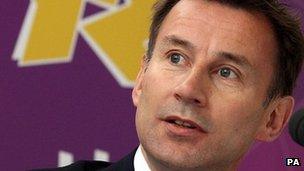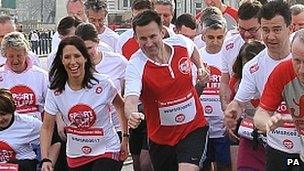Profile: Jeremy Hunt
- Published

Jeremy Hunt is keen to put his side of the Murdoch story
It seems a long time now since Culture Secretary Jeremy Hunt was being talked of as the next Conservative leader.
The 45-year-old, who is appearing at the Leveson Inquiry into media ethics, is politically close to Prime Minister David Cameron and is a popular and well-regarded figure on the Conservative benches in the House of Commons.
But his career is hanging in the balance over claims that he privately supported attempts by News Corporation to take full control of BSkyB when he was meant to be acting in an impartial "quasi-judicial" way.
The culture secretary is accused of being a "cheerleader" for the Murdoch empire and of having a cosy relationship with its executives.
His special adviser, Adam Smith, has already been forced to quit over emails, released by the Leveson Inquiry, which revealed close contacts between Mr Hunt's office and News Corp when the firm was bidding to take over BSkyB.
And the release of dozens of text messages, some of them in a chatty and familiar tone, between Mr Hunt and News Corp lobbyist Fred Michel has caused further embarrassment.
Head boy
Mr Hunt insists he acted with "total integrity" during the bid process and even asked Lord Justice Leveson if he could bring forward his scheduled appearance before the committee in order to put his side of the story.
He has already been forced to explain himself to MPs - with Labour leader Ed Miliband calling for his resignation.
Before the Murdoch allegations surfaced, Mr Hunt had led an almost charmed political life.
The only previous hint of embarrassment was when James Naughtie, presenter of BBC Radio 4's Today programme, slipped and, instead of using the culture secretary's correct surname, let out an expletive which rhymes with it.
Mr Hunt laughed off the faux pas, proclaiming on that most modern of forums - Twitter - that he had found the incident highly amusing.
The eldest son of Adm Sir Nicholas Hunt, Jeremy Hunt was brought up in the Surrey town of Godalming.
He was educated at Charterhouse School, where he became head boy and was known for his love of cross-country running.
He went to Oxford University, gaining a first-class degree in philosophy, politics and economics, and serving as president of the Conservative Association.
He later taught English in Japan, a country whose language he now speaks fluently.
He is married to Lucia, who is from China, and they have two children.
Spending cut
Mr Hunt had a successful career as an entrepreneur before entering Parliament, setting up the educational publisher, Hotcourses, which, as the name suggests, puts prospective students in contact with universities, colleges and other educational institutions.
It now employs more than 230 people and has made him a wealthy man.
But politics was always his paramount interest and, in 2005 he was elected as Conservative MP for the safe seat of South West Surrey, replacing former cabinet minister Virginia Bottomley.
After becoming Tory leader, David Cameron, a contemporary at Oxford, made Mr Hunt the shadow disabilities minister.

Jeremy Hunt has had a love of running since his school days
In a reshuffle in 2007 he was promoted to shadow culture secretary.
When the Conservative-Liberal Democrat coalition entered government in 2010, Mr Hunt joined the cabinet as secretary of state for culture, media and sport - a key role in the run-up to the London 2012 Olympics.
In October 2010, following negotiations led by him, the government froze the BBC's licence fee for six years, prompting the corporation to make large-scale cuts.
In late 2010, secretly recorded comments made by Business Secretary Vince Cable that he had "declared war" on Rupert Murdoch, led to his removal as overseer of the mogul's proposed takeover of broadcaster BSkyB.
The issue landed on the desk of Mr Hunt, who had never made a secret of his admiration for the Murdoch empire, but insisted in public that he was maintaining an impartial stance when it came to ruling on the planned takeover of BSkyB.
'Mon ami'
But emails released by the Leveson inquiry suggest there were back-channel communications between Mr Hunt's office and Fred Michel, the chief lobbyist for James Murdoch, who was leading the bid for BSkyB.
Some of the emails and texts from Mr Michel appear to suggest Mr Hunt was secretly backing the bid and "shared" the Murdochs' objectives.
Mr Hunt insists the material provides a very one-sided account of what was actually happening at the time and he is determined to set the record straight.
The 67 text messages between Mr Hunt and Mr Michel, sent during the period before Mr Hunt took over responsibility for judging whether the BSkyB takeover should go ahead, reveal a personal closeness between the two men, whose wives gave birth in the same hospital during May 2010.
In one text Mr Hunt referred to French-born Mr Michel as "mon ami" and, in another, as "daddy". Separately, in December 2010, he told Mr Michel there was "nothing u won't like" in a forthcoming speech.
The culture secretary is sure to be asked at the Leveson Inquiry whether there was an inappropriate level of contact between himself, his advisers and News Corp, before and during the takeover process, which was eventually stopped when Mr Murdoch decided to discontinue it following the phone-hacking scandal.
Mr Hunt was left free to concentrate on making a success of the 2012 London Olympics. He promised that the event would not be a short-lived showcase for elite sport, but one which would leave a legacy for grassroots sport and of urban renewal in some of east London's most deprived areas.
He also pushed ahead with his plan to set up a network of US-style local TV stations in towns and cities across the UK. The government hopes to license the first stations from this summer.
But these and other plans have had to take a back seat for Mr Hunt, while he fights for his political survival against accusations of collusion with the Murdoch empire.
- Published31 May 2012